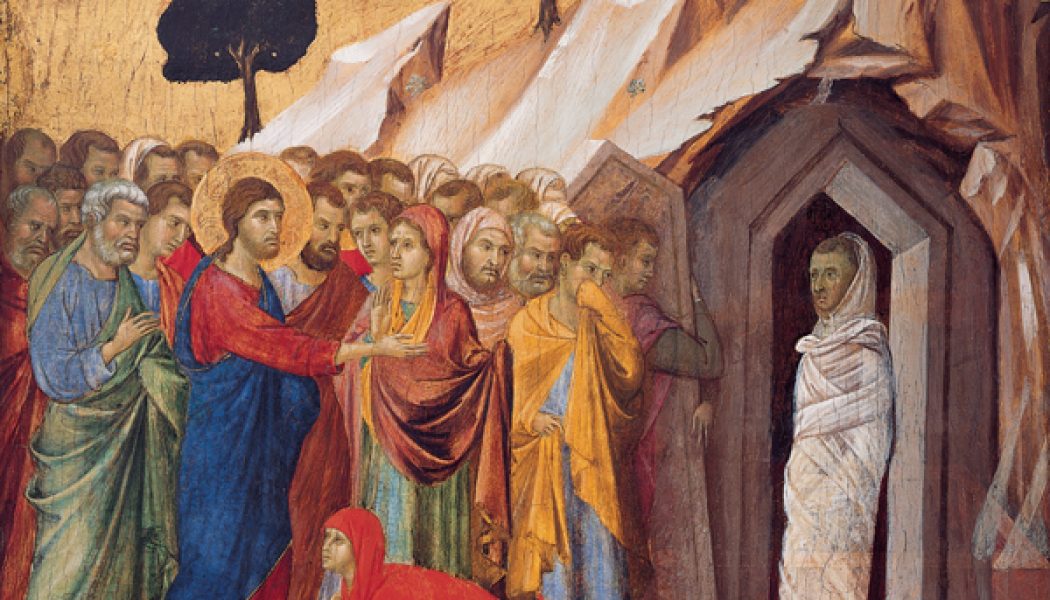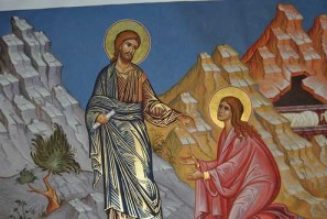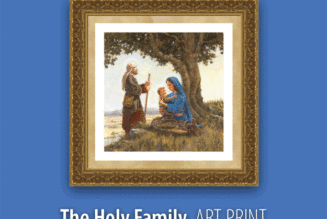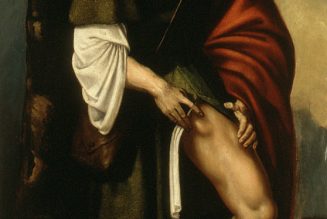
In today’s Gospel, we hear the story of the raising of Lazarus from the dead. The story marks a significant turning point in the ministry of Jesus: it is because of this incident that the Temple leadership in Jerusalem resolves to have Jesus killed; a supreme irony to be sure.
As is proper with all the Gospel accounts, we must not see this as merely an historical happening of some two thousand years ago. Rather, we must recall that we are Lazarus; we are Martha and Mary. This is also the story of how Jesus is acting in our life.
Let’s look at this Gospel in six stages and learn how the Lord acts to save us and raise us to new life.
I. HE PERMITS. Sometimes there are trials in our life, by God’s mysterious design, to bring us to greater things. The Lord permits these trials and difficulties for various reasons. But, if we are faithful, every trial is ultimately for our glory and the glory of God.
Now a man was ill, Lazarus from Bethany, the village of Mary, and her sister Martha. Mary was the one who had anointed the Lord with perfumed oil and dried his feet with her hair; it was her brother Lazarus who was ill. So the sisters sent word to him saying, “Master, the one you love is ill.” When Jesus heard this he said, “This illness is not to end in death, but is for the glory of God, that the Son of God may be glorified through it.”
Notice that Jesus does not rush to prevent the illness of Lazarus. Rather, He permits it temporarily in order that something greater, God’s Glory in Jesus, be made manifest. In addition, it is for Lazarus’ own good and his share in God’s glory.
It is this way with us as well. We do not always understand what God is up to in our life. His ways are often mysterious, even troubling to us. But our faith teaches us that His mysterious permission of our difficulties is ultimately for our good and for our glory.
- Rejoice in this. You may for a time have to suffer the distress of many trials. But this so that your faith, more precious than any fire-tried gold, may lead to praise, honor, and glory when Jesus Christ appears (1 Peter 1: 10).
- But he knows the way that I take; when he has tested me, I will come forth as gold (Job 23:10).
- For our light and momentary troubles are producing for us an eternal glory that far outweighs them all. So we fix our eyes not on what is seen, but on what is unseen, since what is seen is temporary, but what is unseen is eternal (2 Cor 4:17-18).
An old gospel hymn says, “Trials dark on every hand, and we cannot understand, all the way that God will lead us to that blessed promised land. But He guides us with his eye and we follow till we die, and we’ll understand it better, by and by. By and by, when the morning comes, and all the saints of God are gathered home, we’ll tell the story of how we’ve overcome, and we’ll understand it better by and by.”
For now, it is enough for us to know that God permits our struggles for a season and for a reason.
II. HE PAUSES. Here, too, we confront a mystery. Sometimes God says, “Wait.” Again, this is to prepare us for greater things than those for which we ask.
Now Jesus loved Martha and her sister and Lazarus. So when he heard that he was ill, he remained for two days in the place where he was.
Note that the text says that Jesus waits because he loved Martha and Mary and Lazarus. This of course is paradoxical, because we expect love to make one rush to the aid of the afflicted.
Yet Scripture often counsels us to wait.
- Wait on the LORD: be of good courage, and he shall strengthen thine heart: wait, I say, on the LORD (Ps 27:14).
- For thus says the Lord God, the holy one of Israel, “By waiting and by calm you shall be saved, in quiet an in trust, your strength lies” (Isaiah 30:15).
- The Lord is not slow in keeping his promise, as some understand slowness. He is patient with you, not wanting anyone to perish, but everyone to come to repentance … God’s patience is directed to our salvation (2 Pet 3:9).
Somehow our waiting is tied to strengthening us and preparing us for something greater. Ultimately, we need God’s patience in order for us to come to full repentance; so it may not be wise to ask God to rush things. Yet still his delay often mystifies us, especially when the need seems urgent.
Note, too, how Jesus’ delay enables something even greater to take place. It is one thing to heal an ailing man; it is quite another to raise a man who has been dead four days. To use an analogy, Jesus is preparing a meal. Do you want a microwave dinner or a great feast? Great feasts take longer to prepare. Jesus delays, but he’s preparing something great.
For ourselves we can only ask for the grace to hold out. An old gospel song says, “Lord help me to hold out, until my change comes.” Another song says, “Hold on just a little while longer, everything’s gonna be all right.”
III. HE PAYS. Despite the design of God and His apparent delay, He is determined to bless us and save us. Jesus is determined to go and help Lazarus even though He puts himself in great danger in doing so. Notice in the following text how the apostles are anxious about going to Judea; some there are plotting to kill Jesus. In order to help Lazarus, Jesus must put himself at great risk.
Then after this he said to his disciples, “Let us go back to Judea.” The disciples said to him, “Rabbi, the Jews were just trying to stone you, and you want to go back there?” Jesus answered, “Are there not twelve hours in a day? If one walks during the day, he does not stumble, because he sees the light of this world. But if one walks at night, he stumbles, because the light is not in him.” He said this, and then told them, “Our friend Lazarus is asleep, but I am going to awaken him.” So the disciples said to him, “Master, if he is asleep, he will be saved.” But Jesus was talking about his death, while they thought that he meant ordinary sleep. So then Jesus said to them clearly, “Lazarus has died. And I am glad for you that I was not there, that you may believe. Let us go to him.” So Thomas, called Didymus, said to his fellow disciples, “Let us also go to die with him.”
We must never forget the price that Jesus has paid for our healing and salvation. Scripture says, You know that you were ransomed from the futile ways inherited from your fathers, not with perishable things such as silver or gold, but with the precious blood of Christ, like that of a lamb without blemish or spot (1 Pet 1:18).
Indeed, the Apostles’ concerns are borne out: because Jesus raised Lazarus from the dead, the Temple leaders plot to kill him (cf John 11:53). It is of course quite ironic that they should plot to kill Jesus for raising a man from the dead. We can only thank the Lord who, for our sake, endured even death on a cross to purchase our salvation by His own blood.
IV. HE PRESCRIBES. The Lord will die to save us. But there is only one way that saving love can reach us: through our faith. Faith opens the door to God’s blessings, but it is a door we must open, by God’s grace. Thus Jesus inquires into the faith of Martha and later that of Mary.
Martha said to Jesus, “Lord, if you had been here, my brother would not have died. But even now I know that whatever you ask of God, God will give you.” Jesus said to her, “Your brother will rise.” Martha said to him, “I know he will rise, in the resurrection on the last day.” Jesus told her, “I am the resurrection and the life; whoever believes in me, even if he dies, will live, and everyone who lives and believes in me will never die. Do you believe this?” She said to him, “Yes, Lord. I have come to believe that you are the Christ, the Son of God, the one who is coming into the world.”
Jesus prescribes faith because there is no other way. Our faith and our soul are more important to God than our bodies and creature comforts. For what good is it to gain the whole world and lose our soul? We tend to focus on physical things like our bodies, our health, and our possessions; but God focuses on the spiritual things. And so before raising Lazarus and dispelling grief, Jesus checks the condition of Martha’s faith and elicits an act of faith: “Do you believe this?” “Yes, Lord, I have come to believe.”
Scripture connects faith to seeing and experiencing great things:
- All things are possible to him who believes (Mk 9:23).
- If you had faith as small as a mustard seed, you could say to this mountain, “Move from here to there” and it would move. Nothing would be impossible for you (Mt 17:20).
- And he did not do many miracles there because of their lack of faith (Matt 13:58).
- When he had gone indoors, the blind men came to him, and he asked them, “Do you believe that I am able to do this?” “Yes, Lord,” they replied. Then he touched their eyes and said, “According to your faith will it be done to you” (Mat 9:28).
So Jesus has just asked you and me a question: “Do you believe this?” How will you answer? I know how we should answer. But how do we really and truthfully answer?
V. HE IS PASSIONATE. Coming upon the scene Jesus is described as deeply moved, as perturbed, as weeping.
When Jesus saw her weeping and the Jews who had come with her weeping, he became perturbed and deeply troubled, and said, “Where have you laid him?” They said to him, “Sir, come and see.” And Jesus wept. So the Jews said, “See how he loved him.” But some of them said, “Could not the one who opened the eyes of the blind man have done something so that this man would not have died?” So Jesus, perturbed again, came to the tomb. It was a cave, and a stone lay across it. Jesus said, “Take away the stone.” Martha, the dead man’s sister, said to him, “Lord, by now there will be a stench; he has been dead for four days.” Jesus said to her, “Did I not tell you that if you believe you will see the glory of God?” So they took away the stone. And Jesus raised his eyes and said, “Father, I thank you for hearing me. I know that you always hear me; but because of the crowd here I have said this, that they may believe that you sent me.”
In his human heart, Jesus experiences the full force of the loss and the blow that death delivers. That He weeps is something of mystery because He will raise Lazarus in moments. But for this moment, Jesus enters and experiences grief and loss with us. Its full force comes over Him and He weeps—so much so that the bystanders say, “See how much He loved him.”
But there is more going on here. The English text also describes Jesus as being perturbed. The Greek word used is ἐμβριμάομαι (embrimaomai), which means to snort with anger, to express great indignation. It is a very strong word and includes the notion of being moved to admonish sternly. What is this anger of Jesus and at whom is it directed? It is hard to know exactly, but the best answer would seem to be that he is angry at death and at what sin has done. For it was by sin that suffering and death entered the world. It is almost as though Jesus is on the front lines of the battle and has a focused anger against Satan and what he has done. Scripture says, by the envy of the devil death entered the world. (Wisdom 2:23). And God has said, “As surely as I live, declares the Sovereign LORD, I take no pleasure in the death of the wicked, but rather that they turn from their ways and live. Turn! Turn from your evil ways! Why will you die, O house of Israel?” (Ez 33:11)
At the death of some of my own loved ones, I remember experiencing not only sorrow, but also anger. Death should not be. But there it is; it glares back at us, taunts us, and pursues us.
Yes, Jesus experiences the full range of emotions that we do. Out of His sorrow and anger, He is moved to act on our behalf. God’s wrath is His passion to set things right. And Jesus is about to act.
VI. HE PREVAILS. In the end, Jesus always wins. You can skip right to the end of the Bible and see that Jesus wins there, too. You might just as well get on the winning team. He will not be overcome by Satan, even when all seems lost. God is a good God; He is a great God; He can do anything but fail. Jesus can make a way out of no way.
He cried out in a loud voice, “Lazarus, come out!” The dead man came out, tied hand and foot with burial bands, and his face was wrapped in a cloth.
I have it on the best of authority that as Lazarus came out of the tomb he was singing this gospel song: “Faithful is our God! I’m reaping the harvest God promised me, take back what devil stole from me, and I rejoice today, for I shall recover it al1!”
VII. HE PARTNERS.
So Jesus said to them, “Untie him and let him go free.”
Notice something important here: Although Jesus raises Lazarus, and gives him new life, Jesus also commands the bystanders to untie Lazarus and let him go free. Christ raises us, but He has work for the Church to do: untie those He has raised in baptism and let them go free.
To have a personal relationship with Jesus is crucial, but it is also essential to have a relationship to the Church. For after raising Lazarus, Jesus entrusts him to the care of others. Jesus speaks to the Church—parents, priests, catechists, all members of the Church—and gives this standing order regarding the souls He has raised to new life: “Untie them and let them go free.”
We are Lazarus and we were dead in our sin, but we have been raised to new life. Yet we can still be bound by the effects of sin. This is why we need the sacraments, Scripture, prayer, and other ministries of the Church through catechesis, preaching, and teaching. Lazarus’ healing wasn’t a “one and you’re done” scenario and neither is ours.
We are also the bystanders. Just as we are in need of being untied and set free, so do we have this obligation to others. By God’s grace, parents must untie their children and let them go free; pastors must do the same with their flocks. As a priest, I realize how often my people have helped to untie me and let me go free, strengthened my faith, encouraged me, admonished me, and restored me.
This is the Lord’s mandate to the Church regarding every soul He has raised: “Untie him and let him go free.” This is the Lord’s work, but just as Jesus involved the bystanders then, He still involves the Church (which includes us) now.
[embedded content]









